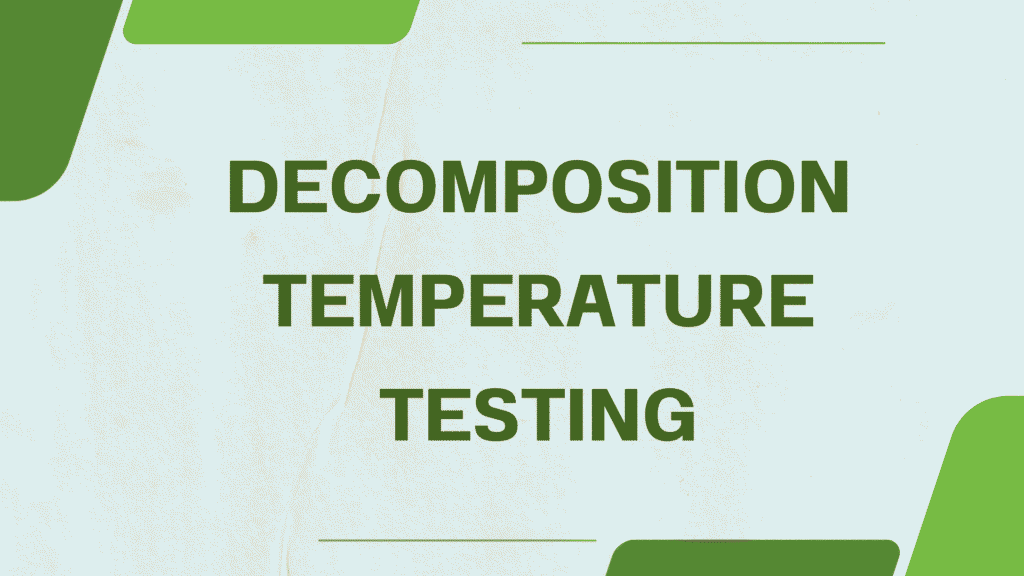Decomposition Temperature Testing

Understanding Decomposition Temperature Testing
Decomposition temperature is the temperature at which a material begins to chemically break down. Accurate measurement of this temperature is essential for evaluating the thermal stability of materials, ensuring their performance and safety across various applications. Decomposition Temperature Testing can be performed using the sophisticated analytical techniques such as TGA and DSC. Please contact us if you have a requirement of Decomposition Temperature Testing for your project, our scientific advisor would be happy to guide you and explore the colloaboration for your project.
Key Aspects of Decomposition Temperature Testing
Decomposition Temperature Defined:
- What It Is: The temperature at which a material starts to decompose upon heating.
- Why It Matters: Identifies the thermal stability and potential breakdown of materials, crucial for their effective application and safety.
Applications of Decomposition Temperature Analysis:
- Material Performance: Helps in selecting materials that will maintain their integrity under specific temperature conditions.
- Manufacturing Processes: Ensures that processing temperatures do not exceed the material’s decomposition temperature, preventing material degradation.
- Safety and Compliance: Assists in complying with safety regulations by understanding and controlling the thermal limits of materials.
Our Analytical Techniques for Decomposition Temperature Testing
At Resolvemass Laboratories Inc., we use advanced analytical techniques to determine the decomposition temperature of your materials:
1. Thermogravimetric Analysis (TGA)
- Principle: Measures weight changes of a sample as it is heated, providing data on thermal decomposition.
- Advantages: Offers comprehensive information on temperature-induced mass loss and decomposition profiles.
2. Differential Scanning Calorimetry (DSC)
- Principle: Monitors heat flow into and out of a sample to detect endothermic or exothermic reactions associated with decomposition.
- Advantages: Provides detailed thermal transition data, including decomposition temperatures and reaction characteristics.
Why Choose Our Services?
Expertise and Precision:
- Advanced Technology: We utilize cutting-edge analytical equipment to ensure accurate and reliable results.
- Experienced Professionals: Our team of Ph.D level experts in Material analytical chemistry provides thorough analysis and insights tailored to your material’s needs.
Comprehensive Solutions:
- Customized Approach: We offer tailored services to meet specific requirements and applications of your materials.
- Broad Industry Applications: Our services support diverse sectors, including pharmaceuticals, materials science, and chemical manufacturing.
Contact Us
Ensure the thermal stability and performance of your materials with our precise decomposition temperature analysis. Reach out to Resolvemass Laboratories Inc. today to learn more about our services and how we can assist with your material characterization needs.
Further Reading:
ASTM E2550-21, Standard Test Method for Thermal Stability by Thermogravimetry
FAQs on Decomposition Temperature Testing
Decomposition temperature testing determines the temperature at which a material begins to chemically break down. It is essential for assessing thermal stability, ensuring material performance, and preventing safety hazards in various applications.
Knowing a material’s decomposition temperature helps predict how it will behave under heat. This information is critical for selecting suitable materials, avoiding degradation during processing, and ensuring compliance with safety standards.
DSC monitors heat flow into or out of a material to detect endothermic or exothermic reactions. This method provides precise data on thermal transitions, including decomposition temperatures and reaction characteristics.
By identifying the temperature limits of materials, testing allows manufacturers to select or modify materials that maintain integrity under heat. This ensures reliable performance and extends the material’s lifespan in real-world applications.
Decomposition temperature testing ensures processing temperatures remain below critical thresholds. This prevents material degradation during production, maintains product quality, and reduces the risk of failures or unsafe conditions.
Yes. Understanding the decomposition temperature is key for regulatory compliance and safety. It helps companies manage thermal risks, prevent hazardous breakdown, and meet industry-specific safety standards.
Resolvemass Laboratories offers advanced equipment, experienced Ph.D.-level analysts, and customized testing solutions. Their precise and reliable services support diverse materials and industries with actionable insights.
References
- Peatross, M. J. (1998). A review of thermal decomposition product testing of halocarbon fire suppression agents (NIST Technical Note No. R0000284). National Institute of Standards and Technology. https://www.nist.gov/document/r0000284pdf
- Barra, G., Guadagno, L., Raimondo, M., Santonicola, M. G., Toto, E., & Vecchio Ciprioti, S. (2023). A comprehensive review on the thermal stability assessment of polymers and composites for aeronautics and space applications. Polymers, 15(18), 3786. https://doi.org/10.3390/polym15183786